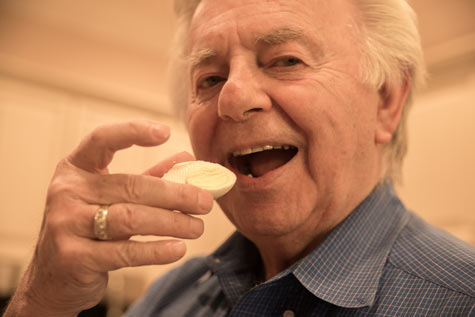
An adequate daily protein intake in seniors is important.
Pass the eggs and cheese, please! Recent research studies are highlighting the need for a protein-rich diet for the elderly, in particular during occasions of stress, such as when battling a chronic disease or acute illness, or getting ready for a surgery or hospitalization, when protein is processed less efficiently. And even when healthy, an adequate daily protein intake in seniors is vital to maintaining muscle strength and mass, healthy bones and so much more.
However, as many as one third of all older adults are not eating sufficient amounts of protein, for a variety of reasons, such as:
- Taste impairments
- Difficulties with swallowing
- Financial constraints
- Reduced appetite
- Dental problems
And, the less active lifestyle that numerous seniors lead further compounds the adverse impacts of too little protein consumption, including:
- Worsening mobility
- Decreased muscle mass and strength
- Lengthier recuperation times when ill
- Eventual loss of independence
The good thing is, individuals who do eat suggested levels of protein are more inclined to continue to maintain independent functionality with tasks including getting dressed and looking after other personal hygiene needs, walking, and climbing stairs. As stated by Wayne Campbell, professor of nutrition science at Purdue University, “While eating an adequate amount of protein is not going to prevent age-associated loss of muscle altogether, not eating enough protein can be an exacerbating factor that causes older adults to lose muscle faster.”
The studies indicate that protein should be acquired from natural food sources, versus via protein shakes. Suggested protein levels are typically .8 grams of protein per 2.2 pounds of body weight every day; so, for a 120-pound woman, that equates to 48 grams of protein/day. However, for those dealing with the stressors cited above, the guideline increases to 1.2 – 1.5 grams of protein per 2.2 pounds of body weight.
These protein-rich foods are excellent options:
- Chicken (28 grams of protein per 3-ounce serving)
- Yogurt (18 grams of protein per 6-ounce serving)
- Cottage cheese (14 grams of protein per ½-cup serving)
- Lentils (9 grams of protein per cup)
- Milk (8 grams of protein per cup)
Naturally, be sure to discuss with the senior’s doctor before making any dietary changes. Once a dietary plan is approved, let Anthem Home Care assist by planning and preparing nutritious, appetizing meals, picking up groceries and making sure the pantry and refrigerator are filled with wholesome meal and snack choices, offering encouragement to maintain an engaged lifestyle, and so much more – all bringing about better overall health.
Call us at any time at 361-643-2323 to inquire about a free in-home consultation for additional details about our knowledgeable care team and why we’re considered one of the top home care agencies in Portland, TX and the surrounding areas. Visit our Service Area page for a full list of the communities we serve.
